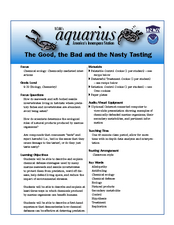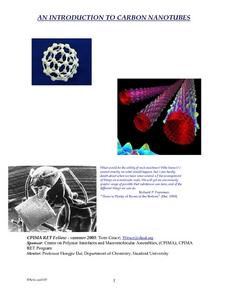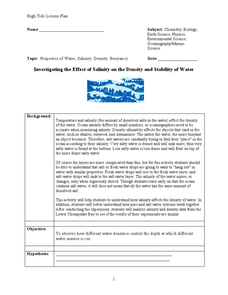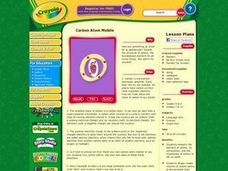Baylor College
Food for the Brain
With a couple of neat diagrams on student handouts, your life science or health class will examine the contents and serving sizes of healthy foods. They dissect a slice of pizza and scrutinize the nutritional value of its components in...
NOAA
Ocean Layers II
Now that you know the ocean has layers, let's name them. The seventh installment of a 23-part NOAA Enrichment in Marine sciences and Oceanography (NEMO) program covers terminology associated with ocean layers, such as thermocline and...
Cornell University
Bacteria Take Over and Down
Bacteria outnumber all other forms of life on Earth. Scholars observe the growth of bacteria in petri dishes to understand their role in maintaining good health. Then, they observe the growth of bacteria after they introduce...
Curated OER
The Good, the Bad and the Nasty Tasting
Students examine the effect of chemicals from marine plants or animals on predator's preferences. In this ecology lesson, students conduct taste tests and collect necessary data. They write their conclusion after analyzing experimental...
Curated OER
2005 Hidden Ocean Expedition What's Eating You?
Analyze data and make inferences about the trophic position of organisms in the Canada marine food web. After a review of the geography and formula, discuss results and write an essay to improve the understanding of Artic food webs.
Curated OER
An Introduction To Carbon Nanotubes
Pupils engage in a study of nanotechnology that is meant to be an enrichment to the already established chemistry curriculum of high school. They are encouraged to make connections to daily life. The lesson includes background...
Curated OER
Water
Students create a water filter according to given criteria. I this chemistry lesson, students evaluate the importance of water in their lives. They develop a book or brochure on the water treatment process.
Curated OER
Scientific Inquiry
Students investigate the general geology, biology, and chemistry of Seneca Lake. They study how to use scientific instruments on the research vessel. They explain how the data they gather will be used by scientists and develop a hypothesis.
Curated OER
I Wood if I Could
Tenth graders investigate the process of how specific products are made from trees. For this chemistry instructional activity, groups of students must choose among ice cream, bubble gum, paper, toothpaste and lipstick. They research,...
Curated OER
Build Your Own Atom
Students build a model of an atom using an online program. In this chemistry lesson, students discuss the different parts of the atom. They complete an independent research about their chosen element.
Curated OER
Playing With Polymers
Students explore the world of polymers. In this chemistry lesson, students make polymers and observe their properties. Follow-up questions and extension activities are included.
Curated OER
Mixing Oil and Water
Students explore physical science by participating in a class experiment. In this chemistry lesson, students discuss what they predict will happen when cooking oil and water are blended together. Students utilize a plastic bottle, food...
Curated OER
Chemical and Physical Changes
Eighth graders investigate different gas behaviors. In this chemistry lesson, 8th graders describe how changing volume and temperature affect gas particles motion. They collect data and make a generalization about these variables'...
Curated OER
An Alien Periodic Table
Students construct a periodic table based on the physical and chemical properties of elements. In this chemistry lesson, students share their work with the class and explain why they classified the elements that way.
Curated OER
Acidity
Sixth graders describe the physical and chemical properties of acids. In this chemistry lesson, 6th graders test the acidity of different solutions. They identify acids and bases using the pH scale.
Curated OER
Carbon: Structure Matters
Students explore the molecular structure of matter and how it can affect the physical characteristics of a specific material. They investigate the role carbon plays in the chemistry of life.
Curated OER
Energy and Conservation
Touching upon energy sources and the causes of pollution, this PowerPoint could be expanded. For example, it describes the greehnouse effect and the problems associated with global warming, but does not indicate that the greenhouse...
Curated OER
Physical and Chemical Changes
In this changes worksheet, students observe and record changes that occur in their every day life and classify these changes as either physical or chemical change. Students record their information in a graphic organizer.
Virginia Department of Education
Moles Lab Activities
Want my name and number? It's 6.0221415 times 10 to the 23rd, and my name is Avogadro. Providing nine different activities, experiments, and labs, this lesson keeps Avogadro relevant to your class all year long.
Curated OER
Investigating the Effect of Salinity on the Density and Stability of Water
Water with varying amounts of dissolved salt are dyed and then used to compare densities. The objective is to discover the effect of salinity, and therefore density, on ocean water on the stability of the ocean. Many branches of science...
Curated OER
Carbon Atom Mobile
Students research the element of carbon, its composition, and the importance of carbon to life on earth. Then they design model mobiles of carbon atoms to demonstrate their understanding of the configuration of protons, neutrons, and...
University of Colorado
Patterns and Fingerprints
Human fingerprint patterns are the result of layers of skin growing at different paces, thus causing the layers to pull on each other forming ridges. Here, groups of learners see how patterns and fingerprints assist scientists in a...
Curated OER
Selected Elements
This collection consists of a slide on each of the following unrelated, but fascinating elements: einsteinium, curium, radium, radon, nobelium, seaborgium, silicon, magnesium, and postassium. You will not find detailed information on the...
Teach Engineering
Basically Acids
Base your lesson plan on acids and bases on an informative resource. The first installment of a five-part module on the science behind Harry Potter has individuals investigate acid/base chemistry with the use of invisible inks. They also...

























